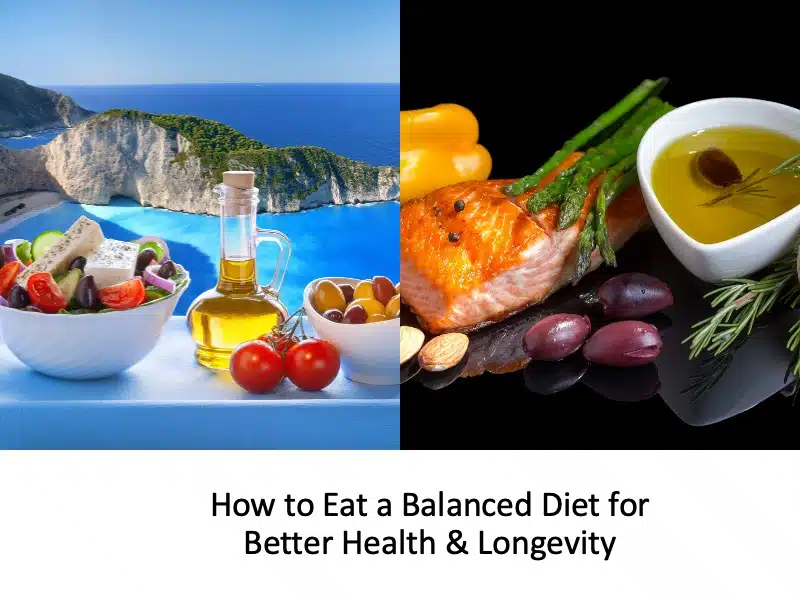How to Eat a Balanced Diet for Better Health & Longevity
A balanced diet is the foundation of good health and longevity. The right balance of macronutrients, micronutrients, and hydration ensures that your body functions optimally, supports physical and mental performance, and reduces the risk of chronic disease.
While calorie control is essential, a sustainable approach involves intuitive eating, focusing on nutrient-dense foods, and making conscious choices that support long-term well-being.
Many people struggle to maintain a healthy diet due to confusing nutrition advice, restrictive meal plans, and unrealistic expectations.
Yo-yo dieting, extreme calorie restriction, and fad diets often lead to short-term weight loss but fail to provide lasting results because they are difficult to sustain.
Emotional eating, social pressures, and the convenience of processed foods further complicate efforts to eat well consistently.
Understanding what a balanced diet truly is can help overcome these challenges by shifting the focus from temporary fixes to long-term, sustainable habits.
A balanced diet is not about deprivation—it’s about providing your body with the right mix of macronutrients, micronutrients, and hydration to function optimally.
It supports physical and mental performance, helps regulate appetite naturally, and reduces the risk of chronic disease.
Instead of relying on willpower alone, learning how to nourish your body with nutrient-dense foods while allowing for flexibility creates a foundation for lasting health and well-being.
What Is a Balanced Diet?
Simply put, a balanced diet provides your body with the necessary macronutrients (proteins, carbohydrates, and fats) and micronutrients (vitamins and minerals) to maintain energy levels, support bodily functions, and promote longevity.
It emphasizes whole, unprocessed foods while allowing for occasional indulgences in moderation.
Key Foods & Drinks to Include in a Healthy, Balanced Diet
Eating a balanced diet starts with choosing nutrient-dense, whole foods that provide the essential macronutrients and micronutrients your body needs.
Prioritizing high-quality proteins, healthy fats, fiber-rich carbohydrates, and gut-friendly foods helps support energy levels, digestion, and overall well-being.
Additionally, whole foods provide essential vitamins and minerals that support immune function, energy production, and longevity.
A diet rich in leafy greens, colorful vegetables, nuts, seeds, and lean proteins ensures sufficient micronutrient intake without the need for excessive supplementation.
By focusing on these key foods, you can build a diet that promotes long-term health while remaining flexible and enjoyable.
High-Quality Proteins
Protein is essential for muscle repair, immune function, and metabolic health.
A well-rounded diet should include a variety of protein sources to ensure adequate intake of essential amino acids, vitamins, and minerals.
Research indicates that incorporating both plant-based and animal-based proteins can optimize health benefits while supporting sustainability.
Plant-Based Proteins
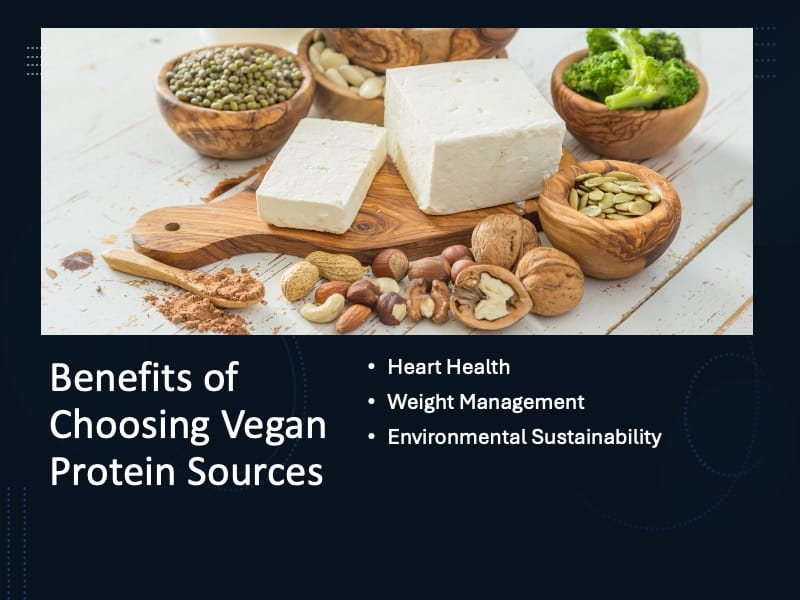
Plant-based proteins provide fiber, antioxidants, and essential nutrients that support overall health and longevity:
- Legumes: Beans, lentils, and chickpeas are excellent sources of protein and fiber, promoting digestive and metabolic health.
- Nuts and Seeds: Almonds, walnuts, pumpkin seeds, chia seeds, and flaxseeds offer a combination of healthy fats and protein, contributing to cardiovascular and cognitive function.
- Whole Grains: Quinoa, farro, and barley contain protein and complex carbohydrates that help sustain energy levels.
- Soy Products: Tofu, tempeh, and edamame are complete proteins that supply all essential amino acids.
Animal-Based Proteins
Animal-based proteins provide high biological value protein, meaning they contain all essential amino acids in optimal proportions.
They also offer crucial micronutrients like vitamin B12, iron, zinc, and omega-3 fatty acids:
- Red Meat (Lean Cuts): Grass-fed beef, bison, and lamb are rich in high-quality protein, iron, vitamin B12, and zinc. When consumed in moderation as part of a balanced diet, lean red meat can help prevent iron deficiency and support muscle health (Wyness, 2015).
- Poultry: Chicken and turkey are excellent sources of lean protein with lower saturated fat than some red meats, making them ideal for maintaining cardiovascular health.
- Fish: Fatty fish such as salmon, mackerel, sardines, and trout provide omega-3 fatty acids, which are essential for heart and brain health. White fish like cod and tilapia offer lean protein with minimal fat.
- Dairy Products: Greek yogurt, cottage cheese, and low-fat milk deliver protein, calcium, and probiotics for muscle maintenance and gut health.
- Eggs: A nutrient-dense complete protein, eggs contain choline, which supports brain function and metabolism.
Balancing plant and animal proteins ensures you receive a diverse range of nutrients while promoting optimal health.
Carbohydrates for Energy & Gut Health
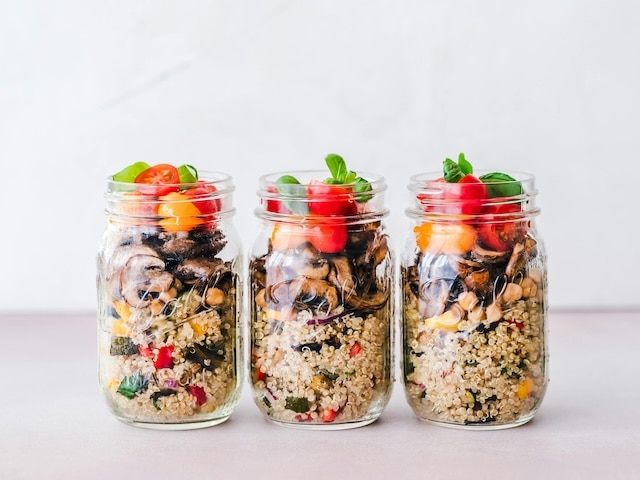
Carbohydrates are the body’s primary energy source, fueling the brain, nervous system, and muscles.
Research indicates that carbohydrate quality, rather than quantity, determines long-term health.
Prioritizing fiber-rich, unprocessed carbohydrates supports digestion, metabolism, and disease prevention.
Interesting Fact: A diet rich in nutrient-dense complex carbs is also beneficial for individuals with stomach issues that require the use of ostomy products in their day-to-day life.
Carbohydrates fall into three main categories:
- Sugars: Quick energy sources best consumed from whole foods like fruits and dairy. Naturally occurring sugars in whole foods come with fiber and nutrients that slow digestion, while added sugars in processed foods contribute to metabolic issues. Fructose from whole fruits is not harmful like high-fructose corn syrup, making apples, pears, and berries valuable carbohydrate sources.
- Starches: Found in whole grains, legumes, and vegetables, providing sustained energy.
- Fiber: Supports gut health, blood sugar regulation, and heart health.
Adults should aim for 45–65% of daily calories from nutrient-dense carbohydrate sources such as whole grains, fruits, vegetables, and legumes.
Studies show that low-carb and balanced diets yield similar long-term weight loss results.
Instead of cutting carbs, focus on high-quality, fiber-rich sources. Research also links increased consumption of whole grains, fruits, and vegetables to lower heart disease risk.
Furthermore, carbohydrate needs depend on activity level:
- Active individuals need more for performance and recovery.
- Sedentary individuals should limit refined carbs to maintain energy balance.
The key is not eliminating carbs but choosing the right ones for sustained energy, digestive health, and disease prevention.
With that being said, here are some of the best carbohydrate sources for a balanced diet:
Whole Grains
Whole grains provide complex carbohydrates that digest slowly, preventing blood sugar spikes and crashes. They also contain essential vitamins, minerals, and fiber, promoting heart health and digestion.
- Brown rice
- Quinoa
- Oats
- Buckwheat
- Sprouted grain breads
Fiber-Rich Fruits and Vegetables
Fruits and vegetables contain a mix of natural sugars, fiber, and antioxidants that enhance immune function and reduce inflammation.
Some of the best sources include:
- Leafy greens (spinach, kale, Swiss chard)
- Cruciferous vegetables (broccoli, cauliflower, Brussels sprouts)
- Berries (blueberries, raspberries, strawberries)
- Root vegetables (sweet potatoes, beets, carrots)
Legumes
Legumes are high in fiber and protein, making them excellent for digestion, metabolic health, and satiety. They help stabilize blood sugar and support cardiovascular function.
- Lentils
- Chickpeas
- Black beans
- Kidney beans
- Green peas
Dairy
Dairy products contain lactose, a natural sugar that provides energy, along with essential nutrients like calcium, vitamin D, and protein. These should be included in moderation based on individual tolerance.
- Greek yogurt
- Cottage cheese
- Milk
Healthy Fats for Longevity & Hormonal Balance
Dietary fats are essential for overall health, serving as a primary energy source, supporting cell membrane integrity, and aiding in the absorption of fat-soluble vitamins A, D, E, and K.
They play a critical role in hormone production, brain function, and inflammation regulation, making high-quality fat sources vital for cardiovascular health, weight management, and cognitive function.
While reducing saturated fat intake was once a primary strategy for preventing cardiovascular disease, research shows that replacing saturated fats with refined carbohydrates does not improve heart health.
Instead, substituting saturated fats with unsaturated fats, particularly polyunsaturated fats (PUFAs), significantly lowers heart disease risk by reducing LDL cholesterol and inflammation.
Higher-fat diets, such as the Mediterranean and ketogenic diets, have been linked to sustainable weight loss and metabolic improvements by promoting satiety and reducing overall calorie intake.
Additionally, fats are crucial for brain function, as the brain is composed of approximately 60% fat, with omega-3 fatty acids—especially DHA—playing a key role in cognitive function and mental health.
Diets rich in omega-3s are associated with a lower risk of neurodegenerative diseases like Alzheimer’s, further emphasizing the importance of consuming healthy fats.
To optimize health, consider the following dietary strategies:
- Prioritize unsaturated fats from olive oil, avocados, nuts, and fatty fish.
- Limit saturated fat intake from processed foods while consuming moderate amounts from whole food sources.
- Avoid trans fats by minimizing consumption of processed and fried foods.
- Incorporate omega-3 fatty acids by consuming fatty fish, flaxseeds, and walnuts.
Saturated Fats
Found in animal products (butter, cheese, red meat) and some plant oils (coconut oil, palm oil), saturated fats have long been associated with increased LDL cholesterol levels.
However, emerging research suggests that the impact of saturated fat on cardiovascular health depends on the food source and dietary pattern.
Monounsaturated Fats (MUFA)
Abundant in olive oil, avocados, and nuts, MUFAs have been shown to improve heart health by reducing LDL cholesterol while maintaining HDL cholesterol levels.
Polyunsaturated Fats (PUFA)
These include omega-6 and omega-3 fatty acids.
Omega-3s, found in fatty fish, flaxseeds, and walnuts, are well known for their anti-inflammatory benefits and cardiovascular protection.
Omega-6s, present in vegetable oils, are essential in moderation but may contribute to inflammation when consumed in excess.
Trans Fats
Primarily found in partially hydrogenated oils, trans fats have been largely removed from the food supply due to their association with increased LDL cholesterol, inflammation, and a heightened risk of cardiovascular disease.
Probiotic-Rich Foods
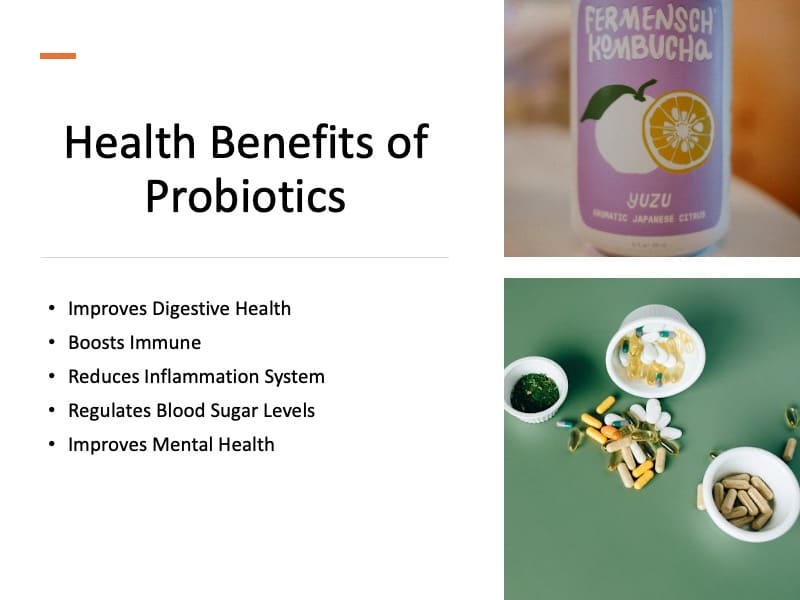
Probiotics are beneficial bacteria that support digestion, immune function, and mental health by maintaining a balanced gut microbiome.
They help restore microbial equilibrium, especially after disruptions caused by antibiotics, infections, or poor diet.
These microorganisms enhance gut barrier integrity, prevent the overgrowth of harmful bacteria, and play a crucial role in modulating inflammation and immune responses.
Probiotics exert their effects by interacting with gut microbes, stimulating the growth of beneficial bacteria, and competing for space and nutrients with harmful pathogens.
They enhance the production of antimicrobial compounds, block pathogen adhesion sites, and strengthen the gut lining to prevent the leakage of harmful substances into the bloodstream.
Some strains also promote the synthesis of short-chain fatty acids (SCFAs), which reduce inflammation and support gut health.
- Probiotics play a vital role in digestive health by alleviating conditions like IBS, IBD, and antibiotic-associated diarrhea while promoting regular bowel movements.
- They also enhance immune function by regulating immune responses, stimulating protective antibodies, and reducing inflammation, which helps lower the risk of infections and autoimmune diseases.
- Emerging research links probiotics to mental well-being through the gut-brain axis, showing their potential to reduce anxiety, depression, and stress by influencing neurotransmitter production.
- Additionally, probiotics contribute to heart health by improving cholesterol levels and metabolic function, while their anti-inflammatory properties support skin health, helping manage conditions like acne, eczema, and rosacea.
Fermented Dairy: A Rich Source of Probiotics
Fermented dairy products are some of the most well-known sources of probiotics, providing a variety of beneficial bacterial strains that support gut health.
- Greek yogurt, for example, contains strains such as Lactobacillus bulgaricus and Streptococcus thermophilus, which help maintain a balanced gut microbiome and improve digestion.
- Kefir, a fermented milk drink, is even more potent, containing up to 30 different strains of bacteria and yeasts, making it one of the most diverse probiotic sources. This diversity contributes to better lactose digestion, immune support, and anti-inflammatory effects.
- Aged cheeses, including gouda, cheddar, and parmesan, also contain probiotic bacteria like Lactobacillus casei, which survive the aging process and promote gut health.
Fermented Vegetables
Fermented vegetables provide a plant-based source of probiotics, offering gut-friendly bacteria along with fiber and antioxidants.
- Sauerkraut, made from fermented cabbage, contains Lactobacillus plantarum, which supports digestion and helps reduce bloating.
- Kimchi, a Korean staple, is packed with probiotics such as Lactobacillus kimchii and other lactic acid bacteria, which improve gut health while also offering anti-inflammatory benefits.
- Pickles that are naturally fermented in salt (rather than vinegar) develop beneficial bacterial strains like Lactobacillus brevis, known for its immune-boosting properties.
These probiotic-rich vegetables enhance gut microbiota diversity while supporting digestion and overall well-being.
Other Fermented Foods
Beyond dairy and vegetables, several other fermented foods offer unique probiotic strains that benefit overall health.
- Miso, a Japanese fermented soybean paste, contains Aspergillus oryzae, a beneficial fungus that aids digestion and supports the gut microbiome.
- Tempeh, an Indonesian fermented soybean product, contains Rhizopus oligosporus, a probiotic mold that promotes better nutrient absorption and gut health.
- Natto, another Japanese fermented soybean dish, is rich in Bacillus subtilis, a powerful probiotic that supports digestion and enhances immune function.
- Kombucha, a fermented tea, provides a mix of bacteria and yeasts, including Saccharomyces and Acetobacter species, which support gut health and detoxification.
These foods expand the range of probiotic options, allowing for a more diverse and beneficial gut microbiome.
Prebiotic-Rich Foods for Gut Microbiome Support

Prebiotics are non-digestible food components that selectively feed beneficial gut bacteria, promoting a healthy and diverse microbiome.
These compounds enhance digestive function, regulate immune responses, and support metabolic health by fostering the growth of beneficial bacteria like Bifidobacteria and Lactobacilli.
Prebiotics function by fermenting in the gut, leading to the production of short-chain fatty acids (SCFAs) such as butyrate, acetate, and propionate.
These compounds improve gut barrier integrity, reduce inflammation, and contribute to overall health by modulating blood sugar levels, appetite regulation, and lipid metabolism.
Research also highlights their role in mental health through the gut-brain axis, influencing neurotransmitter production and stress resilience.
Additionally, prebiotics contribute to heart health by reducing cholesterol and promoting a balanced inflammatory response.
Their impact extends beyond the gut, benefiting bone density, skin health, and immune function.
Vegetables
Certain vegetables are particularly rich in prebiotic fibers, providing essential nourishment for beneficial gut bacteria.
- Garlic & Onions – Contain fructooligosaccharides (FOS) and inulin, which selectively feed beneficial gut bacteria and promote SCFA production.
- Leeks – A potent source of inulin, supporting digestive health and enhancing calcium absorption.
- Asparagus – High in fructans, stimulating beneficial bacteria growth while supporting immune function.
- Dandelion Greens – Contain inulin and polyphenols, offering prebiotic benefits alongside antioxidant properties.
These fiber-rich vegetables enhance digestion, regulate immune responses, and contribute to long-term gut health.
Fruits
Fruits provide a delicious and effective way to support gut microbiome diversity through soluble fiber and polyphenols, both of which act as prebiotics.
- Bananas – Rich in resistant starch, bananas fuel gut bacteria while improving digestion and energy balance.
- Apples (with skin) – Contain pectin, a fermentable fiber that supports SCFA production and gut lining integrity.
- Berries – High in polyphenols, which act as prebiotic compounds, supporting beneficial bacteria and reducing gut inflammation.
These fruits provide a dual benefit, combining fiber-based prebiotics with polyphenols that contribute to gut and metabolic health.
Whole Grains & Legumes
Whole grains and legumes offer slow-digesting fibers, ensuring long-lasting support for gut microbiota balance.
- Oats – Contain β-glucans, which support immune function and promote gut bacteria diversity.
- Barley – A rich source of β-glucans, known for reducing cholesterol and promoting gut health.
- Flaxseeds – High in mucilage fiber, which feeds beneficial bacteria while aiding digestion and bowel regularity.
- Lentils & Chickpeas – Packed with resistant starch and fermentable fibers, they support beneficial bacteria growth while stabilizing blood sugar levels.
Regular consumption of these foods creates a resilient and diverse microbiome, improving digestive efficiency and metabolic health.
Additional Prebiotic-Rich Foods
Beyond vegetables, fruits, and grains, several other foods offer unique prebiotic compounds that enhance gut function.
- Chicory Root – One of the richest sources of inulin, promoting beneficial bacteria and digestive regularity.
- Jerusalem Artichokes – Contain high levels of inulin, supporting gut bacteria growth and calcium absorption.
- Seaweed – Rich in polysaccharides, seaweed nourishes gut bacteria while offering anti-inflammatory benefits.
- Cocoa – Contains polyphenols, which selectively stimulate beneficial gut bacteria while reducing harmful strains.
Incorporating these foods into a balanced diet provides essential nourishment for gut bacteria, leading to improved digestion, immune resilience, and overall well-being.
Hydrating Drinks
Proper hydration is a cornerstone of overall health, supporting everything from cognitive function to athletic performance and digestion.
Water makes up about 60% of the human body, playing a key role in cellular function, temperature regulation, digestion, and joint lubrication.
However, many people underestimate their hydration needs, leading to fatigue, impaired concentration, and long-term health issues.
As a professional athlete with over a decade of experience, I’ve seen firsthand how dehydration can negatively impact both physical and mental performance.
Whether you’re an athlete striving for peak efficiency or simply looking to maintain optimal health, prioritizing hydration is non-negotiable.
Drinking enough fluids throughout the day is the easiest way to stay hydrated.
While water is the gold standard, there are other hydrating beverages that can enhance your hydration efforts by providing electrolytes, vitamins, and minerals.
Here are a few tips to help you stay hydrated:
- Start Your Day with Water – Drinking a glass of water first thing in the morning jumpstarts hydration.
- Carry a Water Bottle – A reusable bottle serves as a constant reminder to drink.
- Use Hydration Apps – Apps like WaterMinder or Hydro Coach help track daily intake.
- Monitor Urine Color – Pale yellow urine indicates adequate hydration, while dark yellow suggests a need for more fluids.
- Hydrate Before, During, and After Exercise – Drink 16-20 ounces before a workout, sip water during, and replenish lost fluids post-workout with 16-24 ounces per pound of sweat lost.
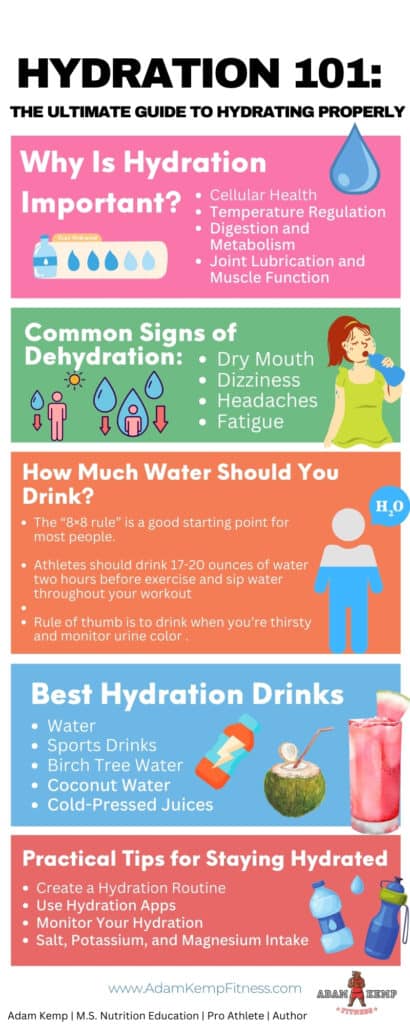
Water
Plain water is the most effective and accessible way to stay hydrated. It supports digestion, circulation, and overall cellular function while keeping body temperature regulated.
Best Practices for Water Intake:
- Drink consistently throughout the day rather than consuming large amounts at once.
- Aim for pale yellow urine as an indicator of proper hydration.
- Increase intake during exercise, in hot climates, or when sick.
Electrolyte-Rich Beverages
Electrolytes like sodium, potassium, and magnesium help regulate fluid balance, muscle function, and nerve signaling.
These minerals are lost through sweat and need to be replenished, especially during exercise or intense physical activity.
Best Electrolyte Drinks:
- Prime Hydration & Gatorade Fit – Low-sugar sports drinks packed with electrolytes to restore hydration without excessive additives.
- Coconut Water – A natural alternative to sports drinks, rich in potassium and other electrolytes.
- Homemade Electrolyte Water – Mix water with a pinch of salt, lemon juice, and a bit of raw honey for a natural hydration boost.
Natural Hydration Alternatives
If plain water isn’t appealing, there are other hydrating drinks that provide additional health benefits.
- Herbal Teas – Caffeine-free and packed with antioxidants, herbal teas like chamomile, peppermint, or ginger can contribute to daily hydration.
- Birch Water – A lesser-known but highly effective hydration drink, birch water contains magnesium, which aids in muscle recovery and fluid balance.
- Cold-Pressed Juices – Made from water-rich fruits and vegetables, these provide vitamins and hydration but should be consumed in moderation due to natural sugars.
Foods & Drinks to Limit or Avoid
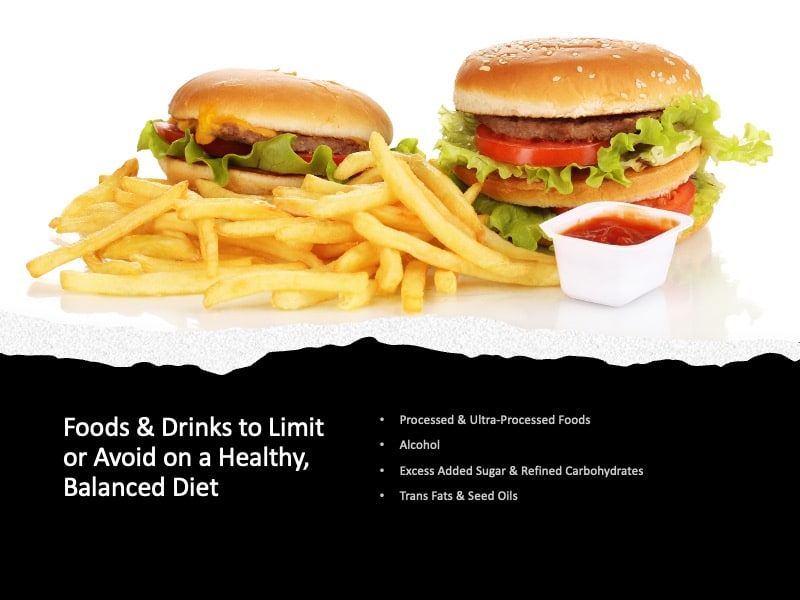
Certain foods can disrupt gut health, trigger inflammation, and negatively impact digestion, immune function, and overall well-being.
While a balanced diet allows for flexibility, consistently consuming highly processed, artificial, or inflammatory foods can harm the gut microbiome, leading to digestive discomfort, metabolic issues, and increased disease risk.
Many processed foods contain artificial additives, refined sugars, and unhealthy fats that fuel harmful gut bacteria while reducing beneficial microbial diversity.
Excessive alcohol, ultra-processed snacks, and artificial sweeteners can also weaken gut barrier integrity, contributing to leaky gut syndrome and systemic inflammation.
Understanding which foods to limit or avoid helps maintain a healthy gut environment, optimize digestion, and promote long-term well-being.
Processed & Ultra-Processed Foods
Processed and ultra-processed foods are often loaded with artificial additives, preservatives, excess sugar, unhealthy fats, and refined grains.
These ingredients contribute to chronic inflammation, disrupt gut microbiome balance, and increase the risk of metabolic diseases like obesity, diabetes, and heart disease.
Many ultra-processed foods are designed to be hyper-palatable, leading to overconsumption and poor dietary habits.
Common processed foods to limit or avoid include:
- Sugary cereals – Often high in refined sugars and artificial flavors, which spike blood sugar levels and provide little nutritional value.
- Sodas – Loaded with high-fructose corn syrup or artificial sweeteners that negatively impact gut health and increase inflammation.
- Packaged snacks – Chips, cookies, and crackers are often made with refined grains, unhealthy fats, and preservatives that contribute to poor digestion and metabolic dysfunction.
- Fast food – Many fast food options contain trans fats, high sodium levels, and low-quality ingredients that can lead to weight gain and insulin resistance.
- Processed meats – Deli meats, hot dogs, and bacon often contain nitrates, preservatives, and unhealthy fats that have been linked to inflammation and digestive issues.
Prioritizing whole, minimally processed foods helps support digestion, energy levels, and long-term health.
Excess Added Sugar & Refined Carbohydrates
Added sugars and refined carbohydrates cause rapid spikes in blood sugar levels, leading to energy crashes, increased cravings, and a higher risk of insulin resistance and type 2 diabetes.
Consistently consuming high-glycemic foods can also contribute to chronic inflammation, weight gain, and imbalanced gut bacteria.
Foods to reduce or avoid include:
- White bread – Made from refined flour that lacks fiber and nutrients, leading to blood sugar spikes.
- Pastries & baked goods – Often high in added sugar, refined flour, and unhealthy fats.
- Candy & sweets – Provide empty calories and contribute to sugar addiction and energy crashes.
- Sodas & sugary drinks – High in high-fructose corn syrup or artificial sweeteners that can damage gut health.
- Fruit juices with added sugar – Lacks fiber and contains high amounts of concentrated sugars, leading to insulin spikes.
Choosing whole food carbohydrate sources like fruits, vegetables, legumes, and whole grains helps maintain stable energy levels and supports gut health.
Alcohol
Excessive alcohol consumption has widespread negative effects on the body, particularly the gut, liver, and brain.
It disrupts gut microbiome balance, increases intestinal permeability (leaky gut), and promotes systemic inflammation.
Alcohol also depletes essential vitamins and minerals, particularly B vitamins, magnesium, and zinc, which are crucial for energy production, brain function, and immune health.
Beyond gut health, alcohol impairs sleep quality, reduces hydration levels, and negatively affects liver detoxification.
While moderate consumption (such as red wine in small amounts) may offer some antioxidant benefits, minimizing or eliminating alcohol is ideal for overall longevity and optimal health.
Trans Fats & Seed Oils
Trans fats and industrial seed oils are highly processed and contribute to inflammation, oxidative stress, and an increased risk of heart disease.
These fats interfere with healthy cellular function and negatively impact cholesterol levels.
Seed oils are often found in processed foods, fried items, and commercial baked goods.
Oils to limit or avoid include:
- Soybean oil – Commonly used in processed foods and fast food frying, linked to increased inflammation.
- Corn oil – Often derived from genetically modified crops and high in omega-6 fatty acids, which can contribute to an imbalanced inflammatory response.
- Canola oil – Frequently used in packaged foods, but highly refined and susceptible to oxidation.
Instead, opt for natural, nutrient-dense fat sources such as:
- Extra virgin olive oil – Rich in monounsaturated fats and antioxidants that support heart health.
- Butter & ghee – Provide fat-soluble vitamins and help maintain a healthy gut lining.
- Avocado oil – A heat-stable oil high in healthy monounsaturated fats and antioxidants.
Eliminating trans fats and choosing healthier fat sources supports heart health, brain function, and reduced inflammation.
The Role of Supplements in a Balanced Diet
While whole foods should always be the foundation of a healthy diet, supplements can help fill nutritional gaps and optimize performance, recovery, and overall well-being.
When considering whole foods vs supplements, it’s important to prioritize nutrient-dense meals while using supplements strategically to address deficiencies or enhance specific aspects of health.
A well-balanced diet provides most essential vitamins and minerals, but factors like busy schedules, dietary restrictions, or increased nutrient demands due to exercise or stress may make supplementation beneficial.
Here are some of the most effective supplements that support overall health, energy, and performance:
Protein Powders: Supporting Muscle Recovery & Growth
Protein is essential for muscle repair, recovery, and overall body function.
While whole food sources like meat, fish, eggs, dairy, legumes, and nuts should be prioritized, protein powders provide a convenient and efficient way to meet daily protein needs, especially for athletes or those with higher protein requirements.
Best Protein Supplements:
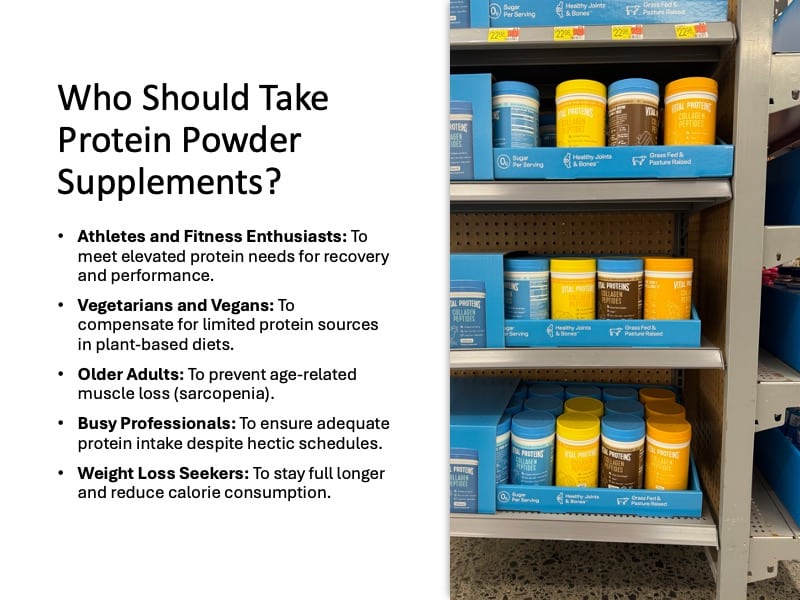
- Whey Protein – Fast-digesting and high in essential amino acids, making it ideal for post-workout recovery.
- Plant-Based Protein – Options like pea, rice, or hemp protein provide a great alternative for those with dairy sensitivities.
- Collagen Protein – Supports joint health, skin elasticity, and muscle recovery, making it beneficial for active individuals.
My favorite protein powder is Garden of Life Protein and Greens:
Last update on 2025-07-11 / This article includes affiliate links/Images via Amazon Product Advertising API. I may earn commissions on purchases made through these links.
Omega-3 Fatty Acids: Reducing Inflammation & Supporting Brain Health
Omega-3 fatty acids, primarily found in fatty fish like salmon and sardines, are essential for heart health, brain function, and reducing inflammation.
However, many people don’t consume enough omega-3s through diet alone, making supplementation beneficial.
Best Omega-3 Sources:
- Fish Oil Supplements – Rich in EPA and DHA, which are key for reducing inflammation and supporting cognitive function.
- Algae-Based Omega-3 – A plant-based alternative suitable for vegetarians and vegans.
My favorite Omega-3 supplement is Nordic Naturals Ultimate Omega Fish Oil, which is rigorously tested for potency, purity and freshness:
Last update on 2025-07-11 / This article includes affiliate links/Images via Amazon Product Advertising API. I may earn commissions on purchases made through these links.
Vitamin D & Magnesium
Vitamin D and magnesium are two of the most commonly deficient nutrients, yet they play vital roles in maintaining bone density, immune function, muscle recovery, and overall energy levels.
If you are looking for the best supplements for bone health, ensuring adequate intake of both nutrients is crucial, as vitamin D enhances calcium absorption, while magnesium supports bone formation and mineralization.
Vitamin D supplements are particularly important for individuals who have limited sun exposure or struggle to get enough from food sources like fatty fish and fortified dairy products.
Pairing vitamin D with magnesium improves its effectiveness, as magnesium helps activate vitamin D in the body, making both nutrients essential for optimal health.
Vitamin D Benefits:
- Supports calcium absorption for strong bones.
- Boosts immune system function.
- Plays a role in mood regulation and mental health.
Magnesium Benefits:
- Supports muscle relaxation and prevents cramps.
- Helps regulate sleep and stress response.
- Aids in energy production and metabolic function.
Best Supplement Sources:
- Vitamin D3 (Cholecalciferol) – More bioavailable than D2 and best absorbed when taken with a meal containing healthy fats. However, you want to make sure your vitamin D supplements contain Vitamin K2 as well, to prevent potential blood clotting issues.
- Magnesium Glycinate or Citrate – Easily absorbed and gentle on digestion, making it ideal for sleep, muscle function, and relaxation.
My favorite Vitamin D supplement is Sports Research Vitamin D3 + K2:
Last update on 2025-07-11 / This article includes affiliate links/Images via Amazon Product Advertising API. I may earn commissions on purchases made through these links.
Creatine
Creatine is one of the most researched and effective supplements for increasing strength, power output, and muscle endurance.
It enhances ATP production, which fuels high-intensity exercise and supports muscle recovery.
Creatine Monohydrate is the most well-researched form, proven to enhance performance and recovery.
There are many good creatine monohydrate supplements, but I prefer Optimum Nutrition Micronized Creatine:
Last update on 2025-07-11 / This article includes affiliate links/Images via Amazon Product Advertising API. I may earn commissions on purchases made through these links.
How to Prepare Balanced, Healthy Meals
Creating balanced, nutritious meals is essential for maintaining energy levels, supporting overall health, and optimizing performance.
A well-structured meal provides the right combination of macronutrients—protein, carbohydrates, and healthy fats—along with fiber, vitamins, and minerals to fuel your body effectively.
As a professional athlete and nutrition educator, I’ve learned that preparing healthy meals doesn’t have to be complicated.
With a few simple strategies, you can build meals that support muscle recovery, sustain energy, and promote long-term well-being.
Whether you’re an athlete looking to optimize performance or simply aiming to improve your diet, understanding how to put together well-balanced meals is key to reaching your goals.
Build Meals Around Whole Foods
A well-balanced meal should be centered around nutrient-dense whole foods that provide sustained energy, essential nutrients, and optimal digestion.
Using a simple plate method ensures each meal supports your health and fitness goals:
- Protein Source (¼ plate) – Incorporate lean meats (chicken, turkey, grass-fed beef), fish, eggs, or plant-based proteins (beans, lentils, tofu, tempeh) to support muscle recovery and satiety.
- Carbohydrate Source (¼ plate) – Choose slow-digesting, fiber-rich carbohydrates like whole grains (quinoa, brown rice, oats), legumes, or starchy vegetables (sweet potatoes, squash) for sustained energy.
- Non-Starchy Vegetables (½ plate) – Fill half your plate with fiber-rich, micronutrient-dense vegetables such as leafy greens, cruciferous vegetables (broccoli, cauliflower, Brussels sprouts), bell peppers, carrots, and zucchini to support digestion and overall health.
- Healthy Fats – Include high-quality fats for brain function and hormone balance. Cook with olive oil, add avocado to meals, or sprinkle nuts and seeds on dishes for extra nutrients and flavor.
Meal Prepping
Planning and preparing meals in advance is one of the best kitchen hacks and can significantly improve dietary consistency, helping you make healthier choices even on busy days.
Batch cooking proteins, grains, and vegetables ensures quick, nutritious meals throughout the week.
Use meal prep containers to portion meals appropriately, and keep healthy snacks like cut vegetables, nuts, and Greek yogurt on hand to reduce reliance on processed foods.
Having nutritious options readily available prevents last-minute unhealthy food choices and makes sticking to your goals much easier.
Cooking Methods Matter: Preserve Nutrients & Avoid Harmful Compounds
The way you cook your food impacts both its nutritional value and overall health benefits.
Opt for gentle cooking methods such as baking, roasting, steaming, or sautéing with healthy oils like olive or avocado oil to retain nutrients and enhance flavor.
Avoid deep frying or cooking at excessively high temperatures, as these methods can produce inflammatory compounds.
Additionally, limit excessive charring of meats, which can create harmful substances linked to health risks.
Making mindful cooking choices ensures that your meals remain both nutritious and delicious.
Healthy Snacking for Sustained Energy
Snacking plays a crucial role in maintaining steady energy levels throughout the day, but it can also be a hidden source of excess calories, unhealthy fats, and added sugars.
Mindless snacking on processed foods can quickly lead to overeating without providing real nourishment.
However, choosing nutrient-dense, satiating snacks can help stabilize blood sugar, curb cravings, and support overall health.
How Snacking Affects Caloric Intake
Many people unknowingly consume hundreds of extra calories daily through snacks, especially those high in refined carbohydrates and unhealthy fats.
Chips, candy, sugary granola bars, and flavored coffee drinks may seem harmless, but they can lead to spikes and crashes in blood sugar, promoting hunger and making it harder to maintain a healthy weight.
By switching to whole food-based snacks, you can stay fuller longer, reduce overall calorie intake, and avoid the cycle of energy crashes and cravings.
Smart Snacking Strategies for Sustained Energy
The key to healthy snacking is choosing options that combine protein, healthy fats, and fiber-rich carbohydrates to keep you full and energized.
Protein-based snacks help build and repair muscles while keeping you satisfied longer:
- Hard-boiled eggs
- Greek yogurt with berries
- Cottage cheese with flaxseeds
- Tuna or salmon packets with whole-grain crackers
Healthy fats and fiber promote satiety and stabilize blood sugar levels:
- Nuts and seeds such as almonds, walnuts, and pumpkin seeds
- Hummus with raw veggies
- Guacamole with whole-grain crackers
- Dark chocolate (85 percent cacao or higher) with a handful of nuts
Complex carbohydrates provide long-lasting energy without blood sugar crashes:
- Fresh fruit with nut butter, such as apple with almond butter or banana with peanut butter
- Homemade energy bars with oats, nuts, and natural sweeteners
- Air-popped popcorn drizzled with olive oil and sprinkled with nutritional yeast
- Chia pudding made with unsweetened almond milk and fresh fruit
Portion Control: Avoid Overeating Snacks
Even nutrient-dense snacks can lead to excess calorie intake if portion sizes aren’t controlled.
While nuts, avocado, and dried fruits are packed with healthy fats and essential nutrients, they are also calorically dense, meaning a handful can add up quickly.
To keep snacking in check:
- Pre-portion snacks instead of eating straight from a large bag or container.
- Balance macronutrients by pairing protein and fiber to increase satiety.
- Listen to hunger cues rather than snacking out of boredom or stress.
By making mindful snack choices, you can fuel your body efficiently, prevent energy crashes, and improve overall health while maintaining a healthy weight.
Calorie Control Without Restriction
Maintaining a healthy weight and supporting overall well-being doesn’t have to mean strict dieting or deprivation.
Many people associate calorie control with restrictive eating, but a more effective and sustainable approach focuses on mindful eating, nutrient-dense foods, and balanced portions.
By understanding how to manage calories without feeling deprived, you can fuel your body properly, maintain steady energy levels, and develop a healthier relationship with food.
Instead of obsessing over every calorie, prioritizing high-quality foods and listening to your body’s hunger and fullness cues can help you achieve your health goals while still enjoying the foods you love.
Understand Your Caloric Needs
Calories play a fundamental role in weight management, but obsessively tracking every bite can be unsustainable and stressful.
Instead, take an intuitive approach by estimating your daily caloric needs based on factors like activity level, metabolism, and personal goals.
Tools like the Harris-Benedict equation or TDEE (Total Daily Energy Expenditure) calculators can provide a starting point, but listening to your body’s hunger and fullness cues is just as important.
Rather than rigid dieting, focus on balanced eating patterns that naturally align with your energy needs.
Prioritize Nutrient Density Over Counting Calories
Not all calories are created equal.
A diet rich in nutrient-dense whole foods helps regulate appetite, optimize metabolism, and prevent energy crashes.
Lean proteins like chicken, fish, and legumes help build and repair muscle while keeping you full.
Fiber-packed vegetables promote digestion and satiety, while healthy fats from sources like avocados, nuts, and olive oil support brain function and hormone balance.
By prioritizing these high-quality foods, you’ll feel more satisfied and naturally reduce overeating without the need for strict calorie counting.
Allow Occasional Treats Without Guilt
A sustainable, long-term approach to nutrition includes flexibility.
Completely cutting out your favorite foods often leads to cravings, frustration, and binge-eating cycles. Instead, enjoy occasional treats in moderation and savor them without guilt.
Labeling foods as “good” or “bad” can create an unhealthy mindset around eating—what matters most is overall consistency.
By incorporating balance, you can maintain progress while still enjoying life’s little indulgences, ensuring your diet remains enjoyable and sustainable.
Final Thoughts: Keys to a Successuful, Balanced Diet for Long-term Health
Achieving and maintaining optimal health isn’t about following a restrictive diet—it’s about building sustainable habits that nourish your body, support your energy levels, and fit your lifestyle.
A balanced diet prioritizes whole, nutrient-dense foods while allowing flexibility for occasional indulgences.
Consistency is more important than perfection.
Small, daily choices—like incorporating more vegetables, staying hydrated, and opting for protein-rich meals—create lasting results over time.
Instead of obsessing over every calorie, focus on mindful eating, portion control, and nutrient quality.
Hydration, meal balance, and smart snacking all play crucial roles in sustaining long-term health.
Supplements can support your needs, but they should never replace whole foods.
Likewise, an intuitive approach to calorie management ensures you maintain a healthy weight without feeling deprived.
The key to lasting success is making healthy eating enjoyable and practical. Find what works for your body, stay flexible, and embrace a balanced approach that fuels your well-being for the long run.
This website does not provide medical advice. This website site does contain affiliate links, and purchases may earn a commission.
Read my Medical Disclaimer, Review Disclaimer, and Publishing Policies for more details. Use of this site indicates acceptance of these terms.

